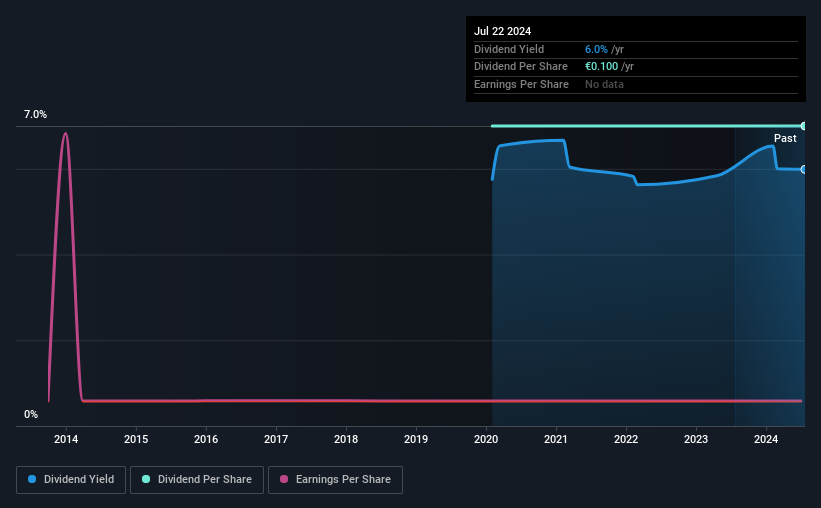
Akelius Residential Property AB (publ)'s (STO:AKEL D) investors are due to receive a payment of €0.025 per share on 12th of August. This means the annual payment is 6.0% of the current stock price, which is above the average for the industry.
See our latest analysis for Akelius Residential Property
Akelius Residential Property's Distributions May Be Difficult To Sustain
We like to see robust dividend yields, but that doesn't matter if the payment isn't sustainable. Akelius Residential Property is unprofitable despite paying a dividend, and it is paying out 588% of its free cash flow. These payout levels would generally be quite difficult to keep up.
Over the next year, EPS might fall by 58.4% based on recent performance. This means the company won't be turning a profit, which could place managers in the tough spot of having to choose between suspending the dividend or putting more pressure on the balance sheet.

Akelius Residential Property Doesn't Have A Long Payment History
The dividend has been pretty stable looking back, but the company hasn't been paying one for very long. This makes it tough to judge how it would fare through a full economic cycle. The payments haven't really changed that much since 4 years ago. We like that the dividend hasn't been shrinking. However we're conscious that the company hasn't got an overly long track record of dividend payments yet, which makes us wary of relying on its dividend income.
The Dividend Has Limited Growth Potential
The company's investors will be pleased to have been receiving dividend income for some time. However, initial appearances might be deceiving. Akelius Residential Property's EPS has fallen by approximately 58% per year during the past five years. Such rapid declines definitely have the potential to constrain dividend payments if the trend continues into the future.
We're Not Big Fans Of Akelius Residential Property's Dividend
In summary, while it is good to see that the dividend hasn't been cut, we think that at current levels the payment isn't particularly sustainable. The company's earnings aren't high enough to be making such big distributions, and it isn't backed up by strong growth or consistency either. We don't think that this is a great candidate to be an income stock.
Investors generally tend to favour companies with a consistent, stable dividend policy as opposed to those operating an irregular one. At the same time, there are other factors our readers should be conscious of before pouring capital into a stock. As an example, we've identified 3 warning signs for Akelius Residential Property that you should be aware of before investing. Looking for more high-yielding dividend ideas? Try our collection of strong dividend payers.
New: Manage All Your Stock Portfolios in One Place
We've created the ultimate portfolio companion for stock investors, and it's free.
• Connect an unlimited number of Portfolios and see your total in one currency
• Be alerted to new Warning Signs or Risks via email or mobile
• Track the Fair Value of your stocks
Have feedback on this article? Concerned about the content? Get in touch with us directly. Alternatively, email editorial-team (at) simplywallst.com.
This article by Simply Wall St is general in nature. We provide commentary based on historical data and analyst forecasts only using an unbiased methodology and our articles are not intended to be financial advice. It does not constitute a recommendation to buy or sell any stock, and does not take account of your objectives, or your financial situation. We aim to bring you long-term focused analysis driven by fundamental data. Note that our analysis may not factor in the latest price-sensitive company announcements or qualitative material. Simply Wall St has no position in any stocks mentioned.
Have feedback on this article? Concerned about the content? Get in touch with us directly. Alternatively, email editorial-team@simplywallst.com
About OM:AKEL D
Akelius Residential Property
Through its subsidiaries, owns, manages, rents, restores, and upgrades residential properties in the United States, Canada, and Europe.
Low with imperfect balance sheet.
Similar Companies
Market Insights
Community Narratives


